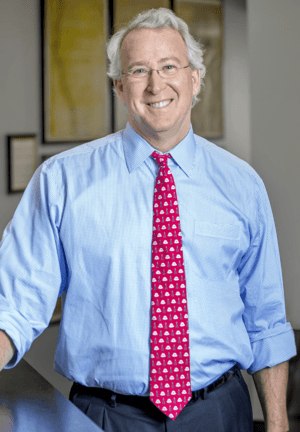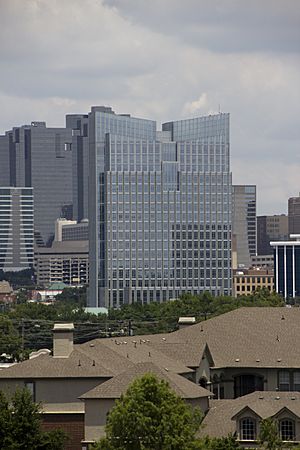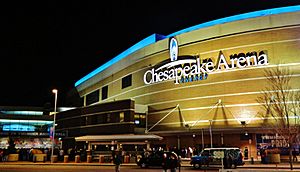Aubrey McClendon facts for kids
Quick facts for kids
Aubrey McClendon
|
|
|---|---|

McClendon in 2014
|
|
| Born |
Aubrey Kerr McClendon
July 14, 1959 Oklahoma City, Oklahoma, U.S.
|
| Died | March 2, 2016 (aged 56) Oklahoma City, Oklahoma, U.S.
|
| Alma mater | Duke University |
| Occupation | CEO |
| Organization | American Energy Partners, LP former CEO of Chesapeake Energy |
Aubrey Kerr McClendon (July 14, 1959 – March 2, 2016) was an American businessman. He was the founder and CEO of American Energy Partners, LP. He also helped start Chesapeake Energy, where he was the CEO and chairman.
McClendon strongly believed that natural gas was a good energy source. He thought it was better than oil and coal. He was also a leader in using a drilling method called fracking.
He was a part-owner of the National Basketball Association (NBA) team, the Oklahoma City Thunder. He helped move the Seattle SuperSonics to Oklahoma City in 2008.
On March 1, 2016, McClendon faced allegations about how he bought oil and natural gas leases. He was accused of working with other companies to avoid competing for these leases. He died the next day, March 2, 2016, in a car accident.
Contents
Early Life and School Days
Aubrey McClendon was born on July 14, 1959. His hometown was Oklahoma City, Oklahoma. His parents were Carole Kerr and Joe Connor McClendon. He was also the great-nephew of Robert S. Kerr, who was a governor and senator for Oklahoma.
Aubrey grew up in Oklahoma City. He went to Belle Isle Elementary School. In 1977, he graduated from Heritage Hall School. He was the senior class president and a top student. As a teenager, Aubrey started a lawn mowing business.
He went to Duke University and graduated in 1981. He earned a degree in history. He also studied accounting. While at Duke, he met his future wife, Kathleen Upton Byrns.
After college, McClendon first worked as an accountant. He became interested in the energy business after reading an article. It was about two men who sold their oil well for a lot of money. He then worked as a landman for an oil and gas company. In 1982, he left to start his own business in the energy field.
Building Energy Companies
Starting Chesapeake Energy

In 1983, McClendon teamed up with Tom L. Ward. They started their first oil and natural gas business. In 1989, they co-founded Chesapeake Energy Corporation. Both were 29 years old at the time.
McClendon became the chairman and CEO of Chesapeake. Ward was the president and chief financial officer. The company began drilling its first wells in Oklahoma in May 1989.
McClendon focused on drilling in new types of rock formations. These included fractured carbonates and shales. He was quick to use horizontal drilling and hydraulic fracturing (fracking) methods. These techniques helped the company grow very fast. People later called him a "visionary leader" in the energy industry.
In 1993, he made the company public. This meant people could buy shares of the company. For the next three years, its stock was very successful. Its value went up by 274% from 1994 to 1997.
In 2005, Forbes Magazine recognized McClendon as one of the country's best-performing executives. A few years later, in 2008, he was the highest-paid CEO among S&P 500 companies. He received $112 million.
In 2008, McClendon had to sell most of his shares in Chesapeake. This was because their value dropped. The company then offered him a five-year contract. It included a $75 million bonus.
In 2011, Forbes magazine called him "America's most reckless billionaire." This was due to his high-risk approach. However, the same year, the magazine also put him on its 20-20 Club list. This list included CEOs who had grown their companies by more than 20% for 20 years.
Chesapeake continued to produce more natural gas under McClendon. Its daily production grew from 5 million to 2.5 billion cubic feet between 2009 and 2013. Chesapeake's discovery of large gas reserves helped lower natural gas prices in the U.S.
In 2012, Bill White, a former U.S. Secretary of Energy, praised McClendon. He called him one of the "heroes" of the American natural gas industry.
In 2012, there were reports that McClendon took out over $1 billion in personal loans. These loans were from companies that also lent money to Chesapeake. This raised questions about fairness and company rules. However, a Chesapeake board review in 2013 found no improper actions.
There were also reports that McClendon used company employees for personal work. He also used company planes for non-business trips. Chesapeake's records showed he paid back most of these costs. His work agreement allowed him to use company planes for safety reasons.
In June 2012, Chesapeake shareholders voted for changes. McClendon gave up his chairman title but stayed as CEO. He stepped down as CEO of Chesapeake on April 1, 2013. At that time, Chesapeake was the second-largest natural gas producer in the U.S.
Since 1992, McClendon had a special program. It allowed him to invest in wells drilled by Chesapeake. This program was part of his work agreement. He could continue to invest in Chesapeake wells until July 2014.
In 2015, Chesapeake filed a lawsuit against McClendon. They accused him of taking company information when he left. McClendon and his new company, American Energy Partners, said he had the right to this information. Later, American Energy – Utica, LLC settled with Chesapeake. They gave Chesapeake 6,000 acres of land and $25 million.
Starting American Energy Partners
On April 2, 2013, McClendon started a new company. It was called American Energy Partners, LP (AELP). This was a private oil and natural gas company. It was based in Oklahoma City.
In 2013 and 2014, McClendon hired over 600 people. He also raised about $15 billion for the company. AELP included several related companies. These companies focused on different energy projects.
Supporting Natural Gas
McClendon was a founder of America's Natural Gas Alliance (ANGA). This group works to support natural gas producers. He strongly believed in using more natural gas in the United States.
In 2007, he helped fund a campaign. It aimed to stop a Texas company from building new coal plants. He also donated to the Sierra Club's "Beyond Coal" campaign. This campaign has stopped many new coal plants in the U.S.
McClendon often spoke publicly about natural gas. He supported fracking and shale drilling. In a 2010 TV interview, he said natural gas was a clean fuel. He also said it created many jobs. He believed natural gas could free the U.S. from relying on foreign oil.
Allegations of Unfair Business Practices
On March 1, 2016, McClendon faced allegations. He was accused of unfair business practices related to buying oil and natural gas leases. The allegations suggested he worked with two other companies. They supposedly agreed not to bid against each other for leases in Oklahoma. This would have removed fair competition for landowners.
The allegations stated this happened from December 2007 to March 2012. The companies would decide who would win bids beforehand. Then, the winner would share the leases with the other company. One of the companies was later reported to be SandRidge Energy, Inc.. The U.S. Justice Department said this was the first case from an ongoing investigation. This investigation looked into unfair practices in the oil and natural gas industry. In 2015, Chesapeake Energy settled similar claims. They agreed to pay $25 million to landowners.
After these allegations, McClendon released a statement. He denied all the claims. He said he had worked for 35 years to create jobs and help Oklahoma's economy. He also said he helped provide energy for the country.
McClendon maintained he was innocent. He died the next day, March 2, 2016, in a car accident.
Other Businesses and Investments
McClendon invested in various food companies and restaurants. These included Jamba Juice. He also owned parts of several restaurants in Oklahoma City. He opened Pops, a burger and soda restaurant, on historic Route 66 in 2007.
From 2004 to 2008, McClendon managed a $200 million investment fund. He also invested $35 million in ProCure Treatment Centers Inc. This company had cancer treatment centers.
Between 2004 and 2006, McClendon bought almost 400 acres of land near Lake Michigan. He paid $39.5 million for it. Local citizens and groups wanted to protect the land. They argued his development plans would harm the area. In 2006, the local board voted to make development harder. McClendon continued with the purchase. In 2007, his team started talking about changing the rules.
In 2009, McClendon sold 171 acres of the land to a land conservancy. In 2010, he filed a lawsuit to challenge the zoning laws. A settlement was reached in 2012. This settlement canceled the 2006 zoning changes.
From 2008 to 2013, McClendon was one of the largest landowners in the U.S. He owned over 100,000 acres.
Oklahoma City Thunder
McClendon was an original member of the group that owns the Oklahoma City Thunder NBA team. He was part of the team that moved the Seattle SuperSonics to Oklahoma City in 2008. The team was then renamed the Oklahoma City Thunder. At that time, McClendon owned 20 percent of the team.
Before the move, in 2007, McClendon made a comment. He said the ownership group "didn't buy the Seattle SuperSonics to keep them in Seattle." The NBA fined him $250,000 for this comment. It went against what the league had said publicly. In 2014, he bought more shares in the Oklahoma City Thunder.
Giving Back to the Community
McClendon gave large donations to many groups in Oklahoma City. He also served on their boards. These included the Boathouse District and the Boathouse Foundation. He supported The McClendon Family Boys and Girls Club of OKC. He also helped the Oklahoma City Chamber of Commerce and the Oklahoma State Fair.
He donated to arts organizations in Oklahoma City. These included the Lyric Theatre and the Oklahoma City Ballet. He also supported the Oklahoma Museum of Art and the Oklahoma City Philharmonic.
From 2011 onwards, McClendon hosted an event for local Boy Scouts. This event took place at his Arcadia Farm property. He donated about $15 million to Duke University. He also gave $12.5 million to the University of Oklahoma.
Awards and Recognition
In 2007, McClendon was inducted into the Oklahoma Hall of Fame. In 2009, he was a top finalist for CEO of the Year. This was at the Platts Global Energy Awards.
In 2010, U.S. Steel Tubular Products, Inc. gave McClendon the Chief Roughneck Award. This award honors leaders in the petroleum industry.
In 2011, he won the Ernst & Young National Entrepreneur of the Year award. This was for his work in Energy, Cleantech, and Natural Resources. In 2013, his old school, Heritage Hall, gave him the Distinguished Alumni Award.
Personal Life and Hobbies
Aubrey McClendon lived in Oklahoma City. His wife was Kathleen Upton Byrns. They had three adult children: Jack, Callie, and Will. Through his wife, he was related to supermodel Kate Upton.
McClendon had a very large wine collection. At one point, it was estimated to have over 100,000 bottles. He also collected old maps of Oklahoma. He owned a number of vintage motor boats as well.
McClendon was an Episcopalian. He sometimes quoted scripture in his work emails. He also had chaplains working at Chesapeake.
See Also
- Billy McFarland (fraudster)
Images for kids
 | Charles R. Drew |
 | Benjamin Banneker |
 | Jane C. Wright |
 | Roger Arliner Young |





